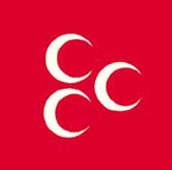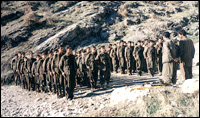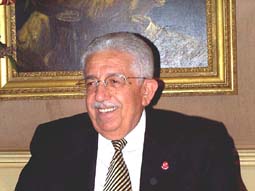23
July 2001
![]()
2. "Turkish soldier and Kurdish rebel killed in clash", a soldier and a Kurdish rebel were killed on Sunday in a clash in the southeastern Turkish province of Elazig, Anatolia news agency reported. The clash occured in a rural area near the town of Alacakaya when security forces, on a routine patrol, confronted a group of about 20 militants from the Kurdistan Workers' Party (PKK), the agency said.
3. "Human rights rules unknown in Southeast", no applications made to seven provincial human rights boards in Eastern Anatolia to date
4. "New Islamic party emerges after Turkish ban", a new Islamic party in Turkey became official on Friday, emerging from the ruins of a party banned last month as subversive and immediately appealing for support from "victims" of the country's economic crisis.
5. "The triggerers of suicides are poverty and emotions", the traditional family structure in Turkish society has been shown to be the main reason behind suicide attempts. Turkish men attempt suicide because of economic problems while Turkish women and youths attempt it for emotional reasons.
1. - Scotland on Sunday - "Nurses virginity test splits Turkey":
ISTANBUL / by James Dorsey
The Turkish government has ordered its health minister to go on
holiday after he sparked public uproar by authorising virginity tests
for high school nursing students suspected of having sex.
The move was made in a bid to protect predominantly Muslim Turkey from prostitution and underage sex.
Bowing to public pressure, extreme right-wing Nationalist Action Party (MHP) leader Devlet Bahceli told the minister, Osman Durmus, that his action had damaged the party and ordered him to take a vacation.
"Go wherever you want but go," Bahceli was quoted as telling Durmus, who is no stranger to scandal. Two years ago he refused foreign blood donations sent to help thousands injured in a massive earthquake that killed some 18,000 people.
He also put a stop to a popular campaign to gather blood donations for a leukaemia victim, saying the blood was being sent to foreign laboratories and could be used by foreigners to "unravel the genetic coding of Turks".
The latest controversy reflects a deep divide both within the MHP, the second largest party in Prime Minister Bulent Ecevit's fragile three-party coalition, as well as in Turkey itself, between conservative and moderate forces.
Both the MHP and the country's Islamists, Turkey's largest opposition grouping, are struggling to maintain adherence to their traditional values while not being seen as obstacles to efforts to overcome a five-month-old financial crisis. It has sparked a devaluation of the national currency of around 50%.
The incident also highlights the gap between a deeply religious majority in Turkey and the country's pro-Western elite that sees itself as part of Europe.
The scandal surrounding Durmus coincides with the launching by the Islamists of a new political party, barely a month after the constitutional court banned the country's only pro-Islamic Virtue party for violating laws that enforce secularism.
Around 60 of the banned party's 102 deputies in the 550-member parliament have joined the newly-established Saadet, or Happiness party, which is likely to take a relatively hard line.
Saadet hopes to win the support of Turkey's poor, who bear the brunt of the economic crisis that has sparked the layoff of some 500,000 people and the bankruptcy of thousands of companies.
Saadet's political programme calls for an end to the behind-the-scenes power of the staunchly secular armed forces, while pledging loyalty to Turkey's goal of becoming a European Union member.
More moderate legislators are grouping around Recep Tayyip Erdogan, the former mayor of Istanbul and one of the most charismatic politicians in Turkey.
Erdogan expects to form a more moderate party within two weeks that will concentrate on social welfare and will not take steps to anger the secular establishment.
Durmus provoked the ire of women's groups, nurses and teachers when he introduced a regulation that would expel students at government-run nursing high schools for having sex, and subject girls who were suspected of having sex to examinations to check if they were virgins.
Girls not passing the test would be expelled from school and barred from studying at other government institutions.
Virginity is a highly emotional issue in Turkey, dividing religious Turks who adhere to traditional values and staunch secularists who see women's equality as a symbol of modernity and Western values.
Forced virginity tests on girls suspected of having had premarital sex were common until the practice was banned in 1999 after five teenage girls took rat poison and threw themselves into a water tank rather than submit to the test.
The Durmus scandal is the second setback in a week for the MHP. The party's transportation minister Enis Oksuz was forced to resign after the Turkish media accused the MHP of blocking an economic recovery programme and the Turkish lira dipped to its lowest-ever level against the dollar.
The lira has dropped more than 50% against the dollar
since Turkey went into financial crisis in February. ![]()
2. - AFP - "Turkish soldier and Kurdish rebel killed in clash":
ANKARA
A soldier and a Kurdish rebel were killed on Sunday in a clash in
the southeastern Turkish province of Elazig, Anatolia news agency reported.
The clash occured in a rural area near the town of Alacakaya when security
forces, on a routine patrol, confronted a group of about 20 militants
from the Kurdistan Workers' Party (PKK), the agency said.
The rebels were ordered to surrender but responded with gunfire. Security forces were continuing to hunt the remaining militants, who managed to run away. Heavy fighting in southeast Turkey has declined since September 1999, when jailed PKK leader Abdullah Ocalan urged his militants to lay down their arms and seek a peaceful resolution to the Kurdish conflict. But the powerful Turkish military has dismissed the peace bid as a ploy, insisting that the rebels should either surrender or face the army.
The PKK launched its armed campaign in 1984 in a bid to
win self-rule in Turkey's mainly Kurdish southeast. The conflict has
claimed some 36,500 lives. ![]()
3. - Turkish Daily News - "Human rights rules unknown in Southeast":
No applications made to seven provincial human rights
boards in Eastern Anatolia to date 
Seven of the Human Rights Provincial Boards, which were set up to
protect human rights and both prevent and investigate violations of
these rights, have not received any applications from anybody, and these
seven boards are all in the Eastern Anatolia region of Turkey, the Anatolia
news agency reported yesterday. The boards are run by assistant provincial
governors and were set up in accordance with a directive dated Nov.
6, 2000.
The boards in Erzurum, Erzincan, Kars, Agri, Bingol, Mus and Tunceli have not received any applications since being established. Chairman of the Human Rights Board in Erzurum and assistant governor Cengiz Gevrek said only one application had been made to the board and that was determined to be outside the remit of the board, anyway. He said they had done enough to tell the people about the board and its duties, but that apart from that one application, nobody had come to them.
Chairman of the Erzincan Human Rights Board and assistant governor Faruk Isik said the complete lack of applications was good news in that it showed there were no human rights violations in Erzincan.
Assistant Governor Riza Dolan running the center in Mus said they were working to inform the people about human rights, getting their children educated and about blood feuds and that by means of education programs they were aiming to enlighten the people.
Other human rights board chairmen all echoed the sentiments
held by Erzincan in that the lack of applications demonstrated a lack
of human rights violations in the province. ![]()
4. - Reuters - "New Islamic party emerges after Turkish ban":
ANKARA 
A new Islamic party in Turkey became official on Friday, emerging
from the ruins of a party banned last month as subversive and immediately
appealing for support from "victims" of the country's economic
crisis.
Recai Kutan, head of the now-outlawed Virtue Party, declared the formation of a party called Saadet, a word with Arabic roots that means happiness. He said the Turkish people would soon bring Saadet to power as a single-party government.
A party program said Turkey's powerful armed forces, a driving force in a campaign to stamp out political Islam, should be kept outside domestic politics. It also pledged loyalty to the long-stated national goal of having Turkey become a member of the European Union but made no reference to the stalled $15.7 billlion IMF loan that is a common subject of debate.
"This party is for the people who are victims of the bad economic situation, people who have lost their jobs, who have been made poor, for workers, civil servants and farmers," Kutan said.
The party program called for measures like tax cuts to revive an economy shaken by a February economic crisis that cut the value of the lira by about a half and put hundreds of thousands out of work.
Kutan said the party would protect religious rights but not challenge the secularist principles of the state. At the same time, he said, Saadet would seek to replace the present constitution entirely to guarantee broader human rights.
Deep in crisis
"While our people and our country are deep in crisis,
we cannot stand aside with the psychology of defeat. With this feeling
of responsibility, we are establishing Saadet, with a new team and a
new spirit," Kutan said on Friday.
"We will serve our people and open our doors to all," he told
supporters at a largely subdued meeting occasionally erupted in chants
of "Kutan-Prime Minister."
Saadet, representing the more conservative wing of Virtue, will vie with a "modernist" party to be formed soon for the allegiance of about 100 parliamentary deputies who became independents after the Virtue Party's ban. Virtue had been the top opposition party in Turkey's 550-seat parliament.
The formation of Saadet is not expected to upset the fundamental balance of power in parliament or in the governing three-party coalition. There had been fears many "homeless" Virtue deputies would turn to government parties, but this does not appear to have happened.
Saadet is expected to operate under the sway of Necmettin Erbakan, banned from politics after another Islamist predecessor, Welfare, was outlawed in 1998 in a clampdown on political Islam spearheaded by the military.
Limiting the Army's role
The new party would seek to limit the power of the influential National Security Council, which brings military and government leaders together by transforming it into an advisory body only on defense issues.
"We perceive the armed forces as a deterrent against threats and attacks from abroad as well as a guarantee of regional and world peace. We believe they should be kept outside domestic political bickering," said the program.
Those goals may attract sympathy from the European Union for which Turkey is a member candidate. But they will find little sympathy in the armed forces, which are broadly regarded as the ultimate guarantor of political stability in Turkey and have staged three coups since the 1960s.
The Constitutional Court issued a ruling Thursday making
it possible for former Istanbul Mayor Recep Tayyip Erdogan to return
to politics. He is likely to head a new modernist party, divorced from
Erbakan, targeting the broad center-right. ![]()
5. - Turkish Daily News - "The triggerers of suicides are poverty and emotions":
The traditional family structure in Turkish society has been shown to be the main reason behind suicide attempts. Turkish men attempt suicide because of economic problems while Turkish women and youths attempt it for emotional reasons.
Cases of attempted suicide increase in the summer season. Although women and youths attempt suicide more often than men, attempts by men result in death more often, the Anatolia news agency reported.
According to Adana Security Directorate records, 23 people committed suicide while seven other attempts were prevented in Adana since the beginning of 2001. Research reveals that 60 percent of suicide attempts stem from economic reasons, 30 percent from family issues originating from economic problems, and 10 percent from other reasons.
Eleven of the suicides in Adana were committed by hanging, eight by self-inflected gunshots and four by other methods.
In Mersin, 41 people attempted to commit suicide in June. While four of them died, 37 were rescued.
Professor Yunus Emre Evlice from the Cukurova Medical Faculty Psychiatry Department said that the reasons for attempting suicide change from one person to another, but hardships in life and poverty have an important affect in these cases.
"Men who are jobless and squeezed by economic problems and expensive life styles attempt to commit suicide more often than women," Evlice said. "It is an undebatable, clear fact that the number of men who commit suicide because of depression brought on by poverty is much higher than the number of women and this stems from the traditional structure of Turkish society."
Evlice stated that in Turkish society a predominant principle
is that men are responsible for providing the economic well-being of
the family. Some men who cannot afford to provide this well-being develop
a feeling of shame and attempt to commit suicide. ![]()